EU Efforts to Export Democracy East Stalled
What’s next for stalled EU efforts to integrate and democratize ex-Soviet states?
September 4, 2013

Vladimir Putin would like to re-create a Russian zone of influence on the old USSR territories. But he is finding amazingly few takers in Ukraine, Belarus, Moldova, Georgia, Armenia and Azerbaijan.
Each country has proud nationalist, strategic and economic reasons to politely say No to the Kremlin’s embrace.
Ukraine has fashioned a self-image of a country occupied by Sovietism with much of its population killed in the 1930s by Stalin’s genocidal Holodomor when between 3 and 10 million Ukrainians were starved to death in the early 1930s.
Meanwhile, Belarus sees itself as an alternative to the Russia of oligarchs, corruption, gangsterism. Moldova wants an end to its breakaway Transnistra region under Russian tutelage.
Georgia wants Russia out of its occupied South Ossetia and Abkhazia regions. Azerbaijan sees itself as a gas state in competition with Putin’s Gazprom.
Armenia is perhaps the only one of the six countries that likes Russia, on account of Kremlin support for its Ngorno-Karabakh problem.
The fact that the wooing by Putin is unlikely to succeed should provide an opening to the European Union’s foreign policy strategy for the region.
And indeed, four years ago, the EU was on the ball. Poland, Sweden and Germany announced the EU’s Eastern Partnership program with great ceremony in 2009.
Its intended purpose was to turn the six neighboring nations — Ukraine, Belarus, Moldova, George, Armenia and Azerbaijan — into states that could eventually join the queue for membership after Croatia, Bulgaria and Romania.
A Stalled Partnership
This concept was based on the long-held view that proximity to the EU and the possibility of future membership would serve as a magic charm to transform countries for the better appears to be running out of steam.
And even though this is one of the European Union’s flagship policies, it is simply not working. The EU is preoccupied with its own troubles and the countries slated for the “Partnership” have seen a regressive distancing from EU norms.
The third summit meeting of the Eastern Partnership will take place in Vilnius in November. It is the main event of Lithuania’s six-month presidency of the EU.
The small Baltic state has worked hard to make its role chairing the EU as efficient as possible. All ministers and officials have been required to prove proficiency in two or more languages.
The United Kingdom, proving itself to be an active European force, has seconded experienced EU experts to work in Lithuanian ministries to help the EU presidency function smoothly.
The big stumbling block, however, is that there is little willingness by the six Eastern Partnership (EaP) members to live up to the conditions Europe has set them.
Belarus remains firmly under one-man rule. Ukraine will not release its imprisoned former prime minister, Yulia Tymoshenko. Georgia’s new rulers insist on treating some of the ministers who recently lost power as criminals to be placed on trial.
Azerbaijan remains indifferent to calls for more freedom. Armenia and Moldova insist that the only role of Europe is to find a solution to its territorial conflicts.
The EU thus has a dilemma. It could insist as non-negotiables the replacement of Lukashenko in Belarus, the freeing of Mrs. Tymoshenko in Ukraine, unlimited media freedom in Azerbaijan and in general the full acceptance of Council of Europe norms in the six countries.
If not, the EU will have to restart its search engine to find other “achievables.”
Homegrown Political Development
The original hope was that this six-pack of countries was just a few years behind Poland or perhaps the Baltic states or Bulgaria on the road to EU membership.
That kind of optimism (or perhaps rather naiveté) is gone.
All these states were fully and completely integrated into the USSR as it existed from 1922 to 1990. They were not like the initially independent Baltic states or the nominally separate central, east and southeast European republics of the Eastern Bloc established during and after World War II, following two decades of self-rule.
Rather, as founding republics of the USSR, these six states had no organic national experience of culture of democracy, rule of law, civil society, journalism and writing to draw upon when the Soviet Union dissolved.
There also were no diasporas with outposts at Harvard, Berkley or All Souls, Oxford to draw upon. As a result, these states literally had to invent European norms along with achieving independence in 1990.
That would have been a heavy load under any circumstance. But these countries had to deal with serious secessionist problems that was driven by mafia-type economic gangsterism and endless interference from the Kremlin, both before and during the Putin era.
It is better to see the EaP bloc in the same light as some Asian and Latin American states in the 1970s and 1980s — incipient market democracies that have not yet arrived.
Asking them to comply fully with EU norms simply won’t work. It is akin to expecting the Korean, Taiwanese or Brazilian authoritarian regimes of their era to have disappeared before their time was up, quite literally.
Countries have to reach a certain level of democratic maturity before they can be seriously expected to achieve that undoubtedly critical goal.
The EU thus needs not to modify the nature of its demands — but apply more realism as to a realistic timetable.
The model should be the 1970s Helsinki process, a more coordinated use of Council of Europe mechanisms and an updated version of the 1970s West German government’s policy of “Wandel durch Annäherung” (gradual transformation through consistently getting closer) toward East Germany.
It was this approach, marked by patience and far-sightedness, that led to the détente era network of contacts. It was this seemingly innocuous mechanism across seemingly impenetrable ideological divides that paved the way for Czechoslavakia’s Charter 77 and Poland’s Solidarnosc.
In practical terms, that means a certain amount of nose-holding political contacts is needed. Pilot programs on visa liberalization should be tried out. Intermediary institutions like universities, trade unions and interfaith NGOs should be used to build contacts as well as regular minister-to-minister contacts.
In addition, the old human rights concept of punishing, sanctioning or boycotting unpleasant governments needs to be rethought.
The great hope of a rollout of European democracy across the new nation-states that were fully part of the USSR was ambitious and noble.
But they have turned to ashes. More practical, modest and incremental goals are needed and should be set at the upcoming summit in Vilnius this coming November.
Takeaways
Putin is finding few takers for a new Russian sphere in Ukraine, Belarus, Moldova, Georgia, Armenia & Azerbaijan.
The belief that proximity to the EU and possibility of membership would magically fix countries ran out of steam.
The EU's ex-Soviet partner states have been unwilling to live up to the conditions Europe has set them.
The EU can insist on non-negotiables with ex-Soviet states but they have made little progress with that approach.
6 of the European Soviet states had no prior experience with home rule, democracy or European norms in 1990.
The old human rights concept of punishing, sanctioning or boycotting unpleasant governments needs to be rethought.
Read previous

Syria and American Democracy
September 4, 2013
